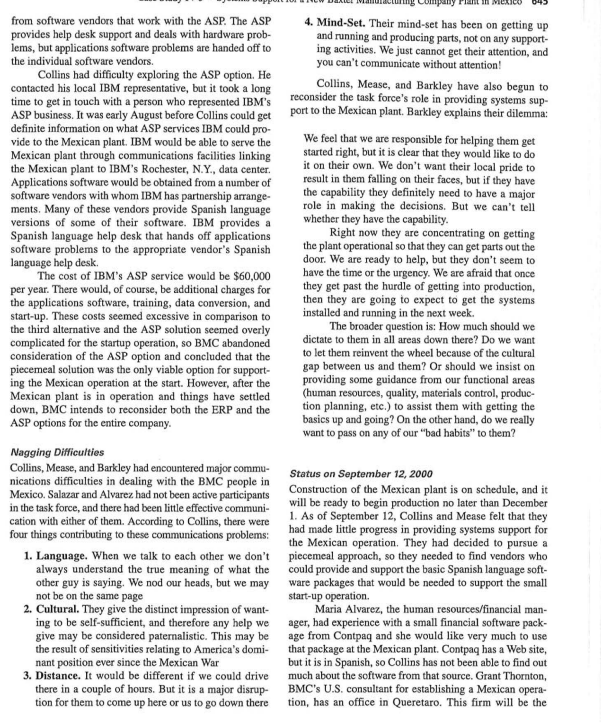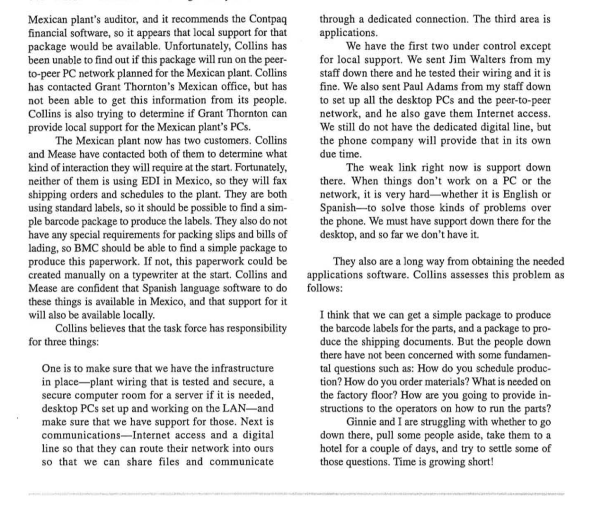Answered step by step
Verified Expert Solution
Question
1 Approved Answer
from software vendors that work with the ASP. The ASP provides help desk support and deals with hardware problems, but applications software problems are handed

 from software vendors that work with the ASP. The ASP provides help desk support and deals with hardware problems, but applications software problems are handed off to the individual software vendors. Collins had difficulty exploring the ASP option. He contacted his local IBM representative, but it took a long time to get in touch with a person who represented IBM's ASP business. It was early August before Collins could get definite information on what ASP services IBM could provide to the Mexican plant. IBM would be able to serve the Mexican plant through communications facilities linking the Mexican plant to IBM's Rochester, N.Y., data center. Applications software would be obtained from a number of software vendors with whom IBM has partnership arrangements. Many of these vendors provide Spanish language versions of some of their software. IBM provides a Spanish language help desk that hands off applications software problems to the appropriate vendor's Spanish language help desk. The cost of IBM's ASP service would be $60,000 per year. There would, of course, be additional charges for the applications software, training, data conversion, and start-up. These costs seemed excessive in comparison to the third alternative and the ASP solution seemed overly complicated for the startup operation, so BMC abandoned consideration of the ASP option and concluded that the piecemeal solution was the only viable option for supporting the Mexican operation at the start. However, after the Mexican plant is in operation and things have settled down, BMC intends to reconsider both the ERP and the ASP options for the entire company. Nagging Difficulties Collins, Mease, and Barkley had encountered major communications difficulties in dealing with the BMC people in Mexico. Salazar and Alvarez had not been active participants in the task force, and there had been little effective communication with either of them. According to Collins, there were four things contributing to these communications problems: 1. Language. When we talk to each other we don't always understand the true meaning of what the other guy is saying. We nod our heads, but we may not be on the same page 2. Cultural. They give the distinct impression of wanting to be self-sufficient, and therefore any help we give may be considered patemalistic. This may be the result of sensitivities relating to America's dominant position ever since the Mexican War 3. Distance. It would be different if we could drive there in a couple of hours. But it is a major disruption for them to come up here or us to go down there 4. Mind-Set. Their mind-set has been on getting up and running and producing parts, not on any supporting activities. We just cannot get their attention, and you can't communicate without attention! Collins, Mease, and Barkley have also begun to reconsider the task force's role in providing systems support to the Mexican plant. Barkley explains their dilemma: We feel that we are responsible for helping them get started right, but it is clear that they would like to do it on their own. We don't want their local pride to result in them falling on their faces, but if they have the capability they definitely need to have a major role in making the decisions. But we can't tell whether they have the capability. Right now they are concentrating on getting the plant operational so that they can get parts out the door. We are ready to help, but they don't seem to have the time or the urgency. We are afraid that once they get past the hurdle of getting into production, then they are going to expect to get the systems installed and running in the next week. The broader question is: How much should we dictate to them in all areas down there? Do we want to let them reinvent the wheel because of the cultural gap between us and them? Or should we insist on providing some guidance from our functional areas (human resources, quality, materials control, production planning, etc.) to assist them with getting the basics up and going? On the other hand, do we really want to pass on any of our "bad habits" to them? Status on September 12, 2000 Construction of the Mexican plant is on schedule, and it will be ready to begin production no later than December 1. As of September 12, Collins and Mease felt that they had made little progress in providing systems support for the Mexican operation. They had decided to pursue a piecemeal approach, so they needed to find vendors who could provide and support the basic Spanish language software packages that would be needed to support the small start-up operation. Maria Alvarez, the human resources/financial manager, had experience with a small financial software package from Contpaq and she would like very much to use that package at the Mexican plant. Contpaq has a Web site, but it is in Spanish, so Collins has not been able to find out much about the software from that source. Grant Thornton, BMC's U.S. consultant for establishing a Mexican operation, has an office in Queretaro. This firm will be the Mexican plant's auditor, and it recommends the Contpaq financial software, so it appears that local support for that package would be available. Unfortunately, Collins has been unable to find out if this package will run on the peerto-peer PC network planned for the Mexican plant. Collins has contacted Grant Thornton's Mexican office, but has not been able to get this information from its people. Collins is also trying to determine if Grant Thornton can provide local support for the Mexican plant's PCs. The Mexican plant now has two customers. Collins and Mease have contacted both of them to determine what kind of interaction they will require at the start. Fortunately, neither of them is using EDI in Mexico, so they will fax shipping orders and schedules to the plant. They are both using standard labels, so it should be possible to find a simple barcode package to produce the labels. They also do not have any special requirements for packing slips and bills of lading, so BMC should be able to find a simple package to produce this paperwork. If not, this paperwork could be created manually on a typewriter at the start. Collins and Mease are confident that Spanish language software to do these things is available in Mexico, and that support for it will also be available locally. Collins believes that the task force has responsibility for three things: One is to make sure that we have the infrastructure in place-plant wiring that is tested and secure, a secure computer room for a server if it is needed, desktop PCs set up and working on the LAN-and make sure that we have support for those. Next is communications-Internet access and a digital line so that they can route their network into ours so that we can share files and communicate through a dedicated connection. The third area is applications. We have the first two under control except for local support. We sent Jim Walters from my staff down there and he tested their wiring and it is fine. We also sent Paul Adams from my staff down to set up all the desktop PCs and the peer-to-peer network, and he also gave them Internet access. We still do not have the dedicated digital line, but the phone company will provide that in its own due time. The weak link right now is support down there. When things don't work on a PC or the network, it is very hard-whether it is English or Spanish-to solve those kinds of problems over the phone. We must have support down there for the desktop, and so far we don't have it. They also are a long way from obtaining the needed applications software. Collins assesses this problem as follows: I think that we can get a simple package to produce the barcode labels for the parts, and a package to produce the shipping documents. But the people down there have not been concerned with some fundamental questions such as: How do you schedule production? How do you order materials? What is needed on the factory floor? How are you going to provide instructions to the operators on how to run the parts? Ginnie and I are struggling with whether to go down there, pull some people aside, take them to a hotel for a couple of days, and try to settle some of those questions. Time is growing short
from software vendors that work with the ASP. The ASP provides help desk support and deals with hardware problems, but applications software problems are handed off to the individual software vendors. Collins had difficulty exploring the ASP option. He contacted his local IBM representative, but it took a long time to get in touch with a person who represented IBM's ASP business. It was early August before Collins could get definite information on what ASP services IBM could provide to the Mexican plant. IBM would be able to serve the Mexican plant through communications facilities linking the Mexican plant to IBM's Rochester, N.Y., data center. Applications software would be obtained from a number of software vendors with whom IBM has partnership arrangements. Many of these vendors provide Spanish language versions of some of their software. IBM provides a Spanish language help desk that hands off applications software problems to the appropriate vendor's Spanish language help desk. The cost of IBM's ASP service would be $60,000 per year. There would, of course, be additional charges for the applications software, training, data conversion, and start-up. These costs seemed excessive in comparison to the third alternative and the ASP solution seemed overly complicated for the startup operation, so BMC abandoned consideration of the ASP option and concluded that the piecemeal solution was the only viable option for supporting the Mexican operation at the start. However, after the Mexican plant is in operation and things have settled down, BMC intends to reconsider both the ERP and the ASP options for the entire company. Nagging Difficulties Collins, Mease, and Barkley had encountered major communications difficulties in dealing with the BMC people in Mexico. Salazar and Alvarez had not been active participants in the task force, and there had been little effective communication with either of them. According to Collins, there were four things contributing to these communications problems: 1. Language. When we talk to each other we don't always understand the true meaning of what the other guy is saying. We nod our heads, but we may not be on the same page 2. Cultural. They give the distinct impression of wanting to be self-sufficient, and therefore any help we give may be considered patemalistic. This may be the result of sensitivities relating to America's dominant position ever since the Mexican War 3. Distance. It would be different if we could drive there in a couple of hours. But it is a major disruption for them to come up here or us to go down there 4. Mind-Set. Their mind-set has been on getting up and running and producing parts, not on any supporting activities. We just cannot get their attention, and you can't communicate without attention! Collins, Mease, and Barkley have also begun to reconsider the task force's role in providing systems support to the Mexican plant. Barkley explains their dilemma: We feel that we are responsible for helping them get started right, but it is clear that they would like to do it on their own. We don't want their local pride to result in them falling on their faces, but if they have the capability they definitely need to have a major role in making the decisions. But we can't tell whether they have the capability. Right now they are concentrating on getting the plant operational so that they can get parts out the door. We are ready to help, but they don't seem to have the time or the urgency. We are afraid that once they get past the hurdle of getting into production, then they are going to expect to get the systems installed and running in the next week. The broader question is: How much should we dictate to them in all areas down there? Do we want to let them reinvent the wheel because of the cultural gap between us and them? Or should we insist on providing some guidance from our functional areas (human resources, quality, materials control, production planning, etc.) to assist them with getting the basics up and going? On the other hand, do we really want to pass on any of our "bad habits" to them? Status on September 12, 2000 Construction of the Mexican plant is on schedule, and it will be ready to begin production no later than December 1. As of September 12, Collins and Mease felt that they had made little progress in providing systems support for the Mexican operation. They had decided to pursue a piecemeal approach, so they needed to find vendors who could provide and support the basic Spanish language software packages that would be needed to support the small start-up operation. Maria Alvarez, the human resources/financial manager, had experience with a small financial software package from Contpaq and she would like very much to use that package at the Mexican plant. Contpaq has a Web site, but it is in Spanish, so Collins has not been able to find out much about the software from that source. Grant Thornton, BMC's U.S. consultant for establishing a Mexican operation, has an office in Queretaro. This firm will be the Mexican plant's auditor, and it recommends the Contpaq financial software, so it appears that local support for that package would be available. Unfortunately, Collins has been unable to find out if this package will run on the peerto-peer PC network planned for the Mexican plant. Collins has contacted Grant Thornton's Mexican office, but has not been able to get this information from its people. Collins is also trying to determine if Grant Thornton can provide local support for the Mexican plant's PCs. The Mexican plant now has two customers. Collins and Mease have contacted both of them to determine what kind of interaction they will require at the start. Fortunately, neither of them is using EDI in Mexico, so they will fax shipping orders and schedules to the plant. They are both using standard labels, so it should be possible to find a simple barcode package to produce the labels. They also do not have any special requirements for packing slips and bills of lading, so BMC should be able to find a simple package to produce this paperwork. If not, this paperwork could be created manually on a typewriter at the start. Collins and Mease are confident that Spanish language software to do these things is available in Mexico, and that support for it will also be available locally. Collins believes that the task force has responsibility for three things: One is to make sure that we have the infrastructure in place-plant wiring that is tested and secure, a secure computer room for a server if it is needed, desktop PCs set up and working on the LAN-and make sure that we have support for those. Next is communications-Internet access and a digital line so that they can route their network into ours so that we can share files and communicate through a dedicated connection. The third area is applications. We have the first two under control except for local support. We sent Jim Walters from my staff down there and he tested their wiring and it is fine. We also sent Paul Adams from my staff down to set up all the desktop PCs and the peer-to-peer network, and he also gave them Internet access. We still do not have the dedicated digital line, but the phone company will provide that in its own due time. The weak link right now is support down there. When things don't work on a PC or the network, it is very hard-whether it is English or Spanish-to solve those kinds of problems over the phone. We must have support down there for the desktop, and so far we don't have it. They also are a long way from obtaining the needed applications software. Collins assesses this problem as follows: I think that we can get a simple package to produce the barcode labels for the parts, and a package to produce the shipping documents. But the people down there have not been concerned with some fundamental questions such as: How do you schedule production? How do you order materials? What is needed on the factory floor? How are you going to provide instructions to the operators on how to run the parts? Ginnie and I are struggling with whether to go down there, pull some people aside, take them to a hotel for a couple of days, and try to settle some of those questions. Time is growing short Step by Step Solution
There are 3 Steps involved in it
Step: 1

Get Instant Access to Expert-Tailored Solutions
See step-by-step solutions with expert insights and AI powered tools for academic success
Step: 2

Step: 3

Ace Your Homework with AI
Get the answers you need in no time with our AI-driven, step-by-step assistance
Get Started


